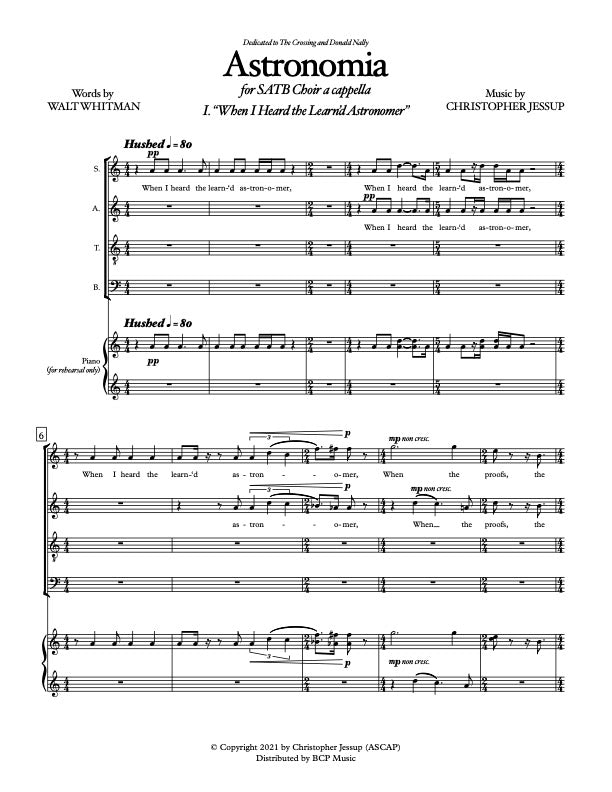BCP Music
Christopher Jessup - Astronomia
Christopher Jessup - Astronomia
Couldn't load pickup availability
for SATB Choir a cappella
Contact Bcpmusic@gmail.com to obtain a perusal score, or proceed to checkout to purchase a piano/vocal score.
Astronomia is a set of three a cappella choral works, each of which use poems by Walt Whitman that center around the theme of astronomy. The first movement, “When I Heard the Learn’d Astronomer,” captures the moment when intellect gives way to intuition, and analytical observation yields to personal, lived experience. In the poem, the speaker listens to a scientific lecture on astronomy, filled with data and diagrams, but soon finds himself disengaged, longing instead for a direct encounter with the stars. Quietly slipping away, he looks up at the night sky in silence, finding a deeper, more spiritual connection with the cosmos. Set to music, this poem invites the choir to explore the contrast between the structured world of reason and the transcendent wonder of simply “looking up in perfect silence at the stars.” The piece is a journey from the noise of the mind to the stillness of the soul.
The second movement, “The Mississippi at Midnight,” is a brief but evocative piece about the quiet power and vastness of nature. In this poem, the mighty river becomes a symbol of timeless flow and silent strength, moving steadily through the stillness of night. Whitman’s language conjures an atmosphere of mystery and awe, inviting reflection on the immensity of the natural world and humanity’s place within it. This piece invites the listener to stand with Whitman on the riverbank, immersed in the beauty and solemnity of the midnight current.
The third movement, “Kosmos,” serves as a profound meditation on the expansive nature of the self and its deep connection to the universe. In this text, Whitman celebrates a human identity that embraces diversity, physicality, spirituality, intellect, and time itself. With sweeping inclusivity, he presents the self as a microcosm of the earth and cosmos—capable of holding contradiction, sensing beauty, engaging with history, and reaching toward the infinite. This piece invites both performers and listeners to inhabit Whitman’s boundless vision of humanity: one that sees the body as sacred, the mind as exploratory, and the spirit as deeply attuned to the rhythms of nature and society. The music, like the poem, becomes an expression of vast inner and outer harmony.
Share




